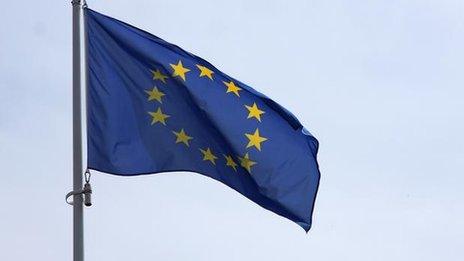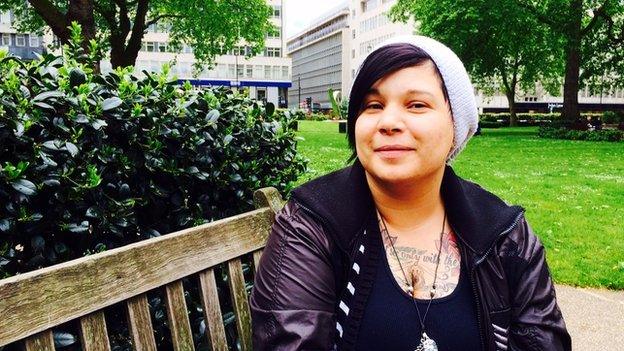Romanian and Bulgarian migration: Dip in workers coming to UK
- Published
The BBC's Home Editor Mark Easton explains the latest figures - in 60 seconds
The number of Romanians and Bulgarians working in the UK has fallen by 4,000 since employment restrictions were lifted in January, but is up 29,000 compared with a year ago, figures show.
The Office for National Statistics (ONS) figures show 140,000 employed in the UK between January and March 2014.
On 1 January, Bulgarians and Romanians gained the same rights to work in the UK as other EU citizens.
Prime Minister David Cameron told MPs the reduction was "notable".
'Inflammatory rhetoric'
The government has not said how many new arrivals it expects as a result of the lifting of temporary restrictions placed on Romanian and Bulgarian migrants when they joined the European Union in 2007.
The pressure group Migration Watch has estimated the UK could expect a rise in population of 50,000 a year from the two countries and the UK Independence Party (UKIP) predicted large numbers of new immigrants.
The figures show the number of people employed in the UK by country of birth.
Chief Secretary to the Treasury Danny Alexander says the data "gives the lie to UKIP's scaremongering on immigration".
He said: "The very modest number of Romanians and Bulgarians coming to work in Britain this year is in stark contrast to the inflammatory rhetoric of earlier this year."
UKIP leader Nigel Farage said the figures showed "another huge increase" in foreign workers.
He added: "Far from controlling immigration, this government has shown it has absolutely no control over Britain's borders and no intention of putting the British people first."
BBC home editor Mark Easton said a "huge wave" of new arrivals clearly hadn't happened in the first three months of the year.
But he said it was too early to get a full picture of the numbers that would move.
"This is just the first three months, there may be all sorts of reasons why that number is not as high as some people predicted."
Partners and children
Sir Andrew Green, of Migration Watch, said he stood by the 50,000 figure, which included partners and children of those seeking work.
"The latest figures suggest there'll be a continuing flow of Romanians and Bulgarians but they don't tell us much about the scale of the flow," he said.
Oxford University's Migration Observatory said there were usually more workers from the two countries in the first three months of a year than the last three months of the previous one.

Senior researcher Dr Carlos Vargas-Silva said the workforce figures were a "valuable first step" but that the long-term implications of lifting the restrictions were still not known.
Bulgarians and Romanians gained the right to visa-free travel to the UK in 2007, when their countries joined the EU. But there were temporary restrictions on the kind of jobs they could take. These expired on 1 January 2014.
The government has recently introduced measures limiting the amount of out-of-work benefits migrants from the European Union can claim.
Keith Vaz, chairman of the Commons Home Affairs Select Committee, said the ONS figures were "unsurprising".
He said: "The committee viewed for itself how the supposed flood of immigration from Romania and Bulgaria was little more than a trickle. It would appear now that many may have actually left the UK."
The ONS also reported an increase in the number of UK workers from the A8 group of countries, which joined the EU in 2004 and include Poland, Latvia and the Czech Republic.
That total was 802,000 - an increase of 74,000 from the last quarter of 2013 and 115,000 year-on-year.
Labour's shadow home secretary Yvette Cooper said the government had to do more "to address people's legitimate concerns".
She said: "Ministers aren't doing enough to stop employers and agencies exploiting cheap migrant labour, particularly from Eastern Europe, to undercut wages and jobs."
- Published14 May 2014
- Published14 May 2014

- Published14 May 2014

- Published14 May 2014